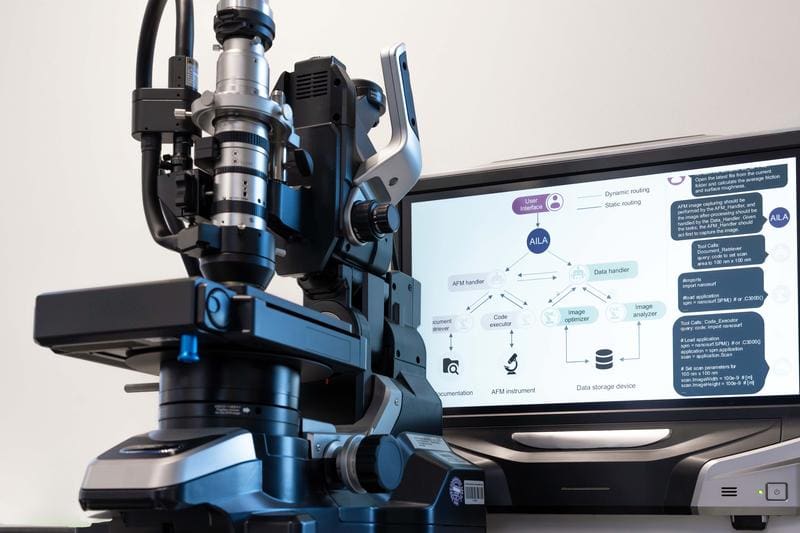World first: AI enables autonomous microscope
An international research team with the participation of the Friedrich Schiller University Jena demonstrated the first microscopy experiment carried out entirely by AI. The goal: the first autonomous laboratory.
Artificial intelligence that independently plans, carries out and evaluates a complete experiment using the atomic force microscope (AFM): This is exactly what an international team of researchers in India, Denmark and Jena has demonstrated. The AI agent AILA (“Artificial Intelligent Lab Assistant”) calibrates the microscope, selects operating modes, stores and analyzes image data ŌĆō and decides whether to re-image if necessary. To accompany their publication in the journal Nature Communications, the team is presenting AFMBench, a benchmark with 100 real-world laboratory tasks to systematically test such agentic systems.

Even though AILA carries out experiments autonomously, it is not a substitute for researchers, emphasizes Lothar Wondraczek, Professor of Glass Chemistry at the Friedrich Schiller University Jena. “We use AI as a tool in science, not as scientists. Our goal is to free up more time for creative activities again,” explains the materials scientist. For example, agent AI orchestrates a number of specialized subtasks ŌĆō from device operation to data evaluation ŌĆō via a multi-level, modular system. “The AI can autonomously carry out complete AFM experiments with all the necessary steps,” Wondraczek explains. “This includes, for example, calibration, the actual measurement and the evaluation of the results.”
One of the first questions concerned the reliability of an AI, especially with access to tools in the physical world. In its work, the team documents, for example, the phenomenon of “sleepwalking”: AI agents can deviate from instructions and take unauthorized steps that go beyond the actual user request. This can mean, for example, that the AI takes pictures even though only a calibration of the microscope was requested. “Autonomous laboratory processes must do exactly what is intended ŌĆō not what happens to be ‘common’. This requires strict rules and security measures, the implementation of which is essential for the further use of such agentic systems.”
Next step: The autonomous laboratory
The work is a building block on the way to networked, autonomous laboratories in which synthesis, analysis and data evaluation converge. An overarching focus of the Jena participants is currently the development of autonomous, energy- and resource-efficient tools for the development of novel glasses ŌĆō from melting raw material mixtures to further process control and analysis of the materials obtained.
“Our goal is a laboratory that can coordinate equipment and process steps independently ŌĆō from sample production to measurement and evaluation. The example of autonomous microscopy is a step on this path, which brings us possibilities, but also reveals new challenges,” says Wondraczek.
Original Paper:
The German Congress of Laboratory Medicine (DKLM) 2025 promises exciting insights into the interface between science and clinical practice. Under the motto “Science for Precision Medicine”, the German Society for Clinical Chemistry and Laboratory Medicine (DGKL) and the Umbrella Association for Technologists and Analysts in Medicine Germany (DVTA) invite experts from research, clinics and industry to meet on October 23 and 24 at the Congress Center Leipzig (CCL). The two-day event is aimed at laboratory physicians, biomedical analysts and decision-makers to discuss current advances in diagnostics and strengthen networks. The MedLabAwards ceremony took place in the Salles de Pologne on 22 October.
Editor: X-Press Journalistenb├╝ro GbR
Gender Notice. The personal designations used in this text always refer equally to female, male and diverse persons. Double/triple naming and gendered designations are used for better readability. ected.




